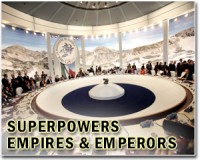| . |  |
. |
Beijing (AFP) Oct 6, 2010 US Defense Secretary Robert Gates and his Chinese counterpart will meet next week at a security conference in Vietnam, Beijing confirmed on Wednesday, in a sign military ties are back on track. Relations between the two countries have repeatedly stalled, with Beijing cancelling scheduled visits or exchanges as a way of protesting at Washington's policies, notably US arms sales to Taiwan. China agreed to resume military-to-military relations after a 10-month break following talks with a senior US defence official last week in Beijing. Chinese Defence Minister Liang Guanglie "is scheduled" to meet with Gates on the fringes of the Association of Southeast Asian Nations (ASEAN) meeting in Hanoi, Xinhua news agency quoted ministry official Guan Youfei as saying. The Pentagon had earlier said the meeting was likely, but had not been officially confirmed. "I think both sides clearly wish to have such a meeting," Pentagon press secretary Geoff Morrell told reporters. In addition to the possible meeting in Hanoi, US and Chinese officials are also hopeful that Gates will visit Beijing in the coming months, possibly early next year, he said. The Chinese have offered an invitation and US officials planned to report back with possible dates for a visit by the Pentagon chief, Morrell said. "Our expectation is that we would be able to travel and engage with the Chinese as soon as possible," he said. Zhu Feng, a US expert at Peking University's School of International Studies, called the announcement a "very important sign" that Washington and Beijing were on the right track. "A meeting of the two defence ministers could signal a new beginning to more pragmatic exchanges," Zhu told AFP. US and Chinese military officials plan to meet about safety and communications issues at sea at an October 14-15 meeting in Hawaii, followed by defence talks later in the year in Washington. Beijing suspended military exchanges in January after the US administration unveiled plans to sell 6.4 billion dollars in military hardware to Taiwan, a self-ruled island which China claims as part of its territory. Gates previously had planned to travel to Beijing as part of an Asian tour in June, but China rebuffed the Pentagon chief and called off the visit. More recently, China has objected to US military exercises with South Korea in the Yellow Sea, part of renewed cooperation between Washington and Seoul in the face of tensions with North Korea. Gates and other top US officials say expanding a dialogue between both countries' armed forces is crucial to avoiding misunderstandings and reducing tensions. Gates has criticised China for suspending ties over the US approach to Taiwan, saying a permanent dialogue was too important to be "held hostage" to Washington's weapons sales to Taipei. China considers Taiwan, where the mainland's defeated nationalists fled in 1949, as part of its territory awaiting reunification, by force if necessary. The resumption of defence ties also comes as smaller nations in the region have sought support from the United States in response to Beijing's assertive stance over disputed waters. "China is not only concerned about weapons sales to Taiwan, but also the security situation in southeast Asia. More exchanges mean there will be more chances to consult on these issues," Zhu said. US officials are anxious about China's growing military reach, including its arsenal of anti-ship missiles and fleet of submarines, and have pressed Beijing to be more transparent about its defence spending. In an annual report to Congress released in August, the Pentagon described China as building up a force with power to strike as far afield as the US territory of Guam. China's military doctrine has traditionally emphasised the ability to strike within an area extending to Japan's Okinawa island chain and throughout the South China Sea east of Vietnam, the report said. But Chinese strategists are now looking to expand their reach further to be able to hit targets such as much of mainland Japan and the Philippines, it said. The United States has about 100,000 troops in Asia excluding Afghanistan, the vast majority of them in Japan and South Korea.
Share This Article With Planet Earth
Related Links Learn about the Superpowers of the 21st Century at SpaceWar.com Learn about nuclear weapons doctrine and defense at SpaceWar.com
 Beijing confirms US-China defence ministers to meet
Beijing confirms US-China defence ministers to meetBeijing (AFP) Oct 6, 2010 Beijing on Wednesday confirmed that US Defense Secretary Robert Gates and his Chinese counterpart will meet next week at a security conference in Vietnam, in a sign military ties are back on track. Relations between the two countries have repeatedly stalled, with Beijing cancelling scheduled visits or exchanges as a way of protesting at Washington's policies, notably US arms sales to Taiwan. ... read more |
|
| The content herein, unless otherwise known to be public domain, are Copyright 1995-2010 - SpaceDaily. AFP and UPI Wire Stories are copyright Agence France-Presse and United Press International. ESA Portal Reports are copyright European Space Agency. All NASA sourced material is public domain. Additional copyrights may apply in whole or part to other bona fide parties. Advertising does not imply endorsement,agreement or approval of any opinions, statements or information provided by SpaceDaily on any Web page published or hosted by SpaceDaily. Privacy Statement |